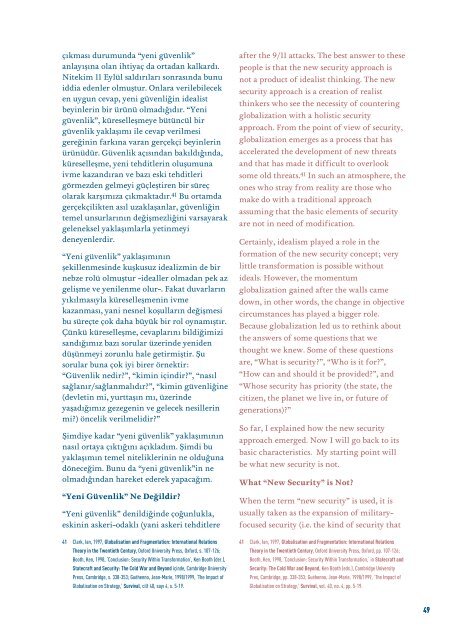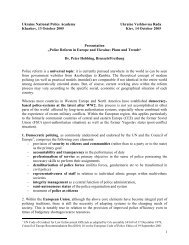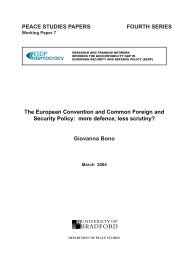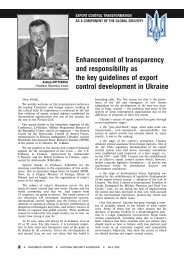Security Sector Governance: Turkey and Europe - DCAF
Security Sector Governance: Turkey and Europe - DCAF
Security Sector Governance: Turkey and Europe - DCAF
You also want an ePaper? Increase the reach of your titles
YUMPU automatically turns print PDFs into web optimized ePapers that Google loves.
ç›kmas› durumunda “yeni güvenlik”<br />
anlay›fl›na olan ihtiyaç da ortadan kalkard›.<br />
Nitekim 11 Eylül sald›r›lar› sonras›nda bunu<br />
iddia edenler olmufltur. Onlara verilebilecek<br />
en uygun cevap, yeni güvenli¤in idealist<br />
beyinlerin bir ürünü olmad›¤›d›r. “Yeni<br />
güvenlik”, küreselleflmeye bütüncül bir<br />
güvenlik yaklafl›m› ile cevap verilmesi<br />
gere¤inin fark›na varan gerçekçi beyinlerin<br />
ürünüdür. Güvenlik aç›s›ndan bak›ld›¤›nda,<br />
küreselleflme, yeni tehditlerin oluflumuna<br />
ivme kaz<strong>and</strong>›ran ve baz› eski tehditleri<br />
görmezden gelmeyi güçlefltiren bir süreç<br />
olarak karfl›m›za ç›kmaktad›r. 41 Bu ortamda<br />
gerçekçilikten as›l uzaklaflanlar, güvenli¤in<br />
temel unsurlar›n›n de¤iflmezli¤ini varsayarak<br />
geleneksel yaklafl›mlarla yetinmeyi<br />
deneyenlerdir.<br />
“Yeni güvenlik” yaklafl›m›n›n<br />
flekillenmesinde kuflkusuz idealizmin de bir<br />
nebze rolü olmufltur -idealler olmadan pek az<br />
geliflme ve yenilenme olur-. Fakat duvarlar›n<br />
y›k›lmas›yla küreselleflmenin ivme<br />
kazanmas›, yani nesnel koflullar›n de¤iflmesi<br />
bu süreçte çok daha büyük bir rol oynam›flt›r.<br />
Çünkü küreselleflme, cevaplar›n› bildi¤imizi<br />
s<strong>and</strong>›¤›m›z baz› sorular üzerinde yeniden<br />
düflünmeyi zorunlu hale getirmifltir. fiu<br />
sorular buna çok iyi birer örnektir:<br />
“Güvenlik nedir?”, “kimin içindir?”, “nas›l<br />
sa¤lan›r/sa¤lanmal›d›r?”, “kimin güvenli¤ine<br />
(devletin mi, yurttafl›n m›, üzerinde<br />
yaflad›¤›m›z gezegenin ve gelecek nesillerin<br />
mi?) öncelik verilmelidir?”<br />
fiimdiye kadar “yeni güvenlik” yaklafl›m›n›n<br />
nas›l ortaya ç›kt›¤›n› aç›klad›m. fiimdi bu<br />
yaklafl›m›n temel niteliklerinin ne oldu¤una<br />
dönece¤im. Bunu da “yeni güvenlik”in ne<br />
olmad›¤›ndan hareket ederek yapaca¤›m.<br />
“Yeni Güvenlik” Ne De¤ildir?<br />
“Yeni güvenlik” denildi¤inde ço¤unlukla,<br />
eskinin askeri-odakl› (yani askeri tehditlere<br />
41 Clark, Ian, 1997, Globalisation <strong>and</strong> Fragmentation: International Relations<br />
Theory in the Twentieth Century, Oxford University Press, Oxford, s. 107-126;<br />
Booth, Ken, 1998, ‘Conclusion: <strong>Security</strong> Within Transformation’, Ken Booth (der.),<br />
Statecraft <strong>and</strong> <strong>Security</strong>: The Cold War <strong>and</strong> Beyond içinde, Cambridge University<br />
Press, Cambridge, s. 338-353; Guéhenno, Jean-Marie, 1998/1999, ‘The Impact of<br />
Globalisation on Strategy,’ Survival, cilt 40, say› 4, s. 5-19.<br />
after the 9/11 attacks. The best answer to these<br />
people is that the new security approach is<br />
not a product of idealist thinking. The new<br />
security approach is a creation of realist<br />
thinkers who see the necessity of countering<br />
globalization with a holistic security<br />
approach. From the point of view of security,<br />
globalization emerges as a process that has<br />
accelerated the development of new threats<br />
<strong>and</strong> that has made it difficult to overlook<br />
some old threats. 41 In such an atmosphere, the<br />
ones who stray from reality are those who<br />
make do with a traditional approach<br />
assuming that the basic elements of security<br />
are not in need of modification.<br />
Certainly, idealism played a role in the<br />
formation of the new security concept; very<br />
little transformation is possible without<br />
ideals. However, the momentum<br />
globalization gained after the walls came<br />
down, in other words, the change in objective<br />
circumstances has played a bigger role.<br />
Because globalization led us to rethink about<br />
the answers of some questions that we<br />
thought we knew. Some of these questions<br />
are, “What is security?”, “Who is it for?”,<br />
“How can <strong>and</strong> should it be provided?”, <strong>and</strong><br />
“Whose security has priority (the state, the<br />
citizen, the planet we live in, or future of<br />
generations)?”<br />
So far, I explained how the new security<br />
approach emerged. Now I will go back to its<br />
basic characteristics. My starting point will<br />
be what new security is not.<br />
What “New <strong>Security</strong>” is Not?<br />
When the term “new security” is used, it is<br />
usually taken as the expansion of militaryfocused<br />
security (i.e. the kind of security that<br />
41 Clark, Ian, 1997, Globalisation <strong>and</strong> Fragmentation: International Relations<br />
Theory in the Twentieth Century, Oxford University Press, Oxford, pp. 107-126;<br />
Booth, Ken, 1998, ‘Conclusion: <strong>Security</strong> Within Transformation,’ in Statecraft <strong>and</strong><br />
<strong>Security</strong>: The Cold War <strong>and</strong> Beyond, Ken Booth (eds.), Cambridge University<br />
Pres, Cambridge, pp. 338-353; Guéhenno, Jean-Marie, 1998/1999, ‘The Impact of<br />
Globalisation on Strategy,’ Survival, vol. 40, no. 4, pp. 5-19.<br />
49

















